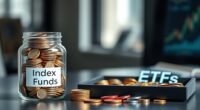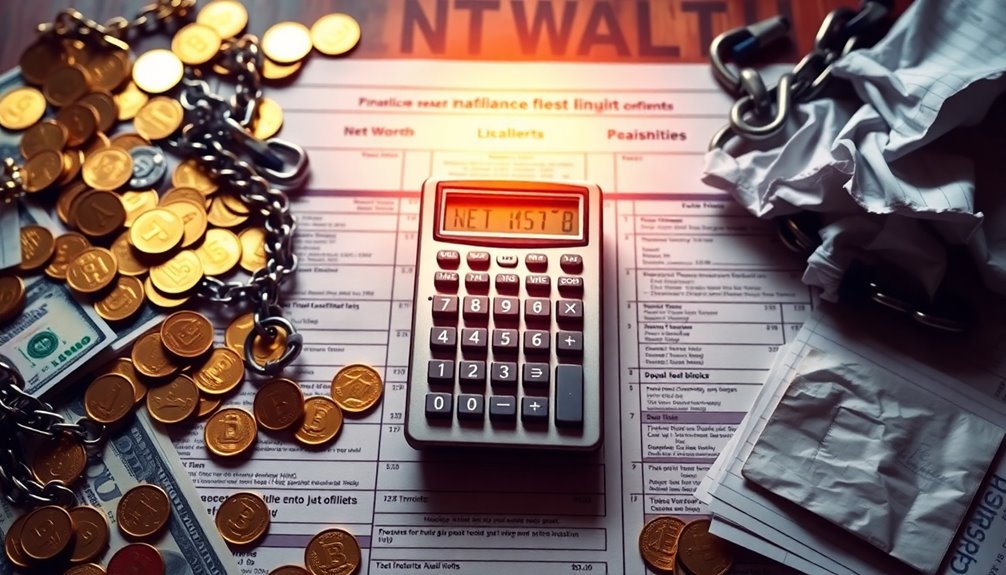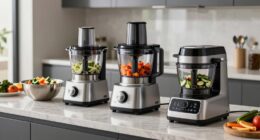To find a safe high-yield savings account offering 5% or more, focus on the bank’s stability and persistent rates. Choose a reputable institution insured by FDIC or NCUA, and verify its financial health through reviews and credit ratings. Watch out for promotional rates that may drop later, and confirm the account has manageable fees and easy access. Keep these tips in mind, and you’ll be better equipped to spot the safest, most reliable options.
Key Takeaways
- Verify the bank is FDIC or NCUA insured to ensure deposit safety up to $250,000.
- Choose established banks with strong financial ratings and positive reputation for stability.
- Confirm the high interest rate is sustainable and not just a temporary promotion.
- Review account terms for low fees, easy access, and minimal restrictions on withdrawals.
- Balance high rates with the bank’s reputation, security measures, and customer service quality.

Are you looking for a smarter way to grow your savings? High-yield savings accounts can be a powerful tool if you want to earn more on your money without risking it in the stock market. But with so many options out there offering above 5%, it’s essential to choose one that’s both lucrative and secure. When evaluating these accounts, two key factors come into play: interest rates and bank stability. While high interest rates attract you with the promise of more earnings, you also need to guarantee the bank backing the account is stable enough to protect your funds.
Interest rates are the main draw of high-yield savings accounts, often markedly higher than traditional savings accounts. However, these rates can fluctuate based on economic conditions and the policies of the bank or financial institution. It’s important to look beyond the headline rate and understand whether it’s a promotional offer or a sustainable, ongoing rate. Some banks temporarily boost their interest rates to attract new customers, but these offers may change after a set period. To maximize your returns, seek accounts with consistently high rates that are backed by reputable institutions.
Bank stability is equally critical. You want to make sure your money is safe, especially when earning high interest rates that can sometimes come from newer or less established banks. Federal insurance, such as the FDIC for banks or the NCUA for credit unions, provides peace of mind by insuring deposits up to $250,000 per account holder. Always verify that the bank is insured and has a strong financial standing. Established banks with long histories and solid financials tend to be more reliable, reducing your risk of losing funds if the institution faces difficulties.
When selecting a high-yield savings account, consider the overall health of the bank, not just the interest rate. Look into customer reviews, the bank’s credit rating, and any recent news about its financial stability. Some online banks offer better rates because they have lower overhead costs, but you should still check their reputation and ensure they’re insured. Also, consider how easy it is to access your money, whether the account has minimum balance requirements, and if there are any fees that could eat into your earnings. Additionally, understanding the interest rate sustainability of an account can help ensure your earnings remain consistent over time.
Frequently Asked Questions
How Do I Open a High-Yield Savings Account Online?
You can open a high-yield savings account online by visiting the bank’s website or using their mobile banking app. Fill out the application form with your personal details, upload any required identification, and fund your account. Make sure the bank offers good customer service and easy mobile banking access. Once approved, you can manage your savings conveniently through their online platform, ensuring a smooth and secure experience.
Are There Any Fees Associated With High-Yield Savings Accounts?
Imagine a world where your savings grow without sneaky fees! Most high-yield savings accounts have minimal or no account fees and maintenance costs, making them super affordable. Some may charge a small fee if you exceed withdrawal limits, but overall, these accounts are designed to keep your money safe and accessible. Always read the fine print to avoid unexpected charges, and you’ll enjoy high returns without the extra costs.
How Often Do High-Yield Rates Change?
Interest rate fluctuations happen frequently, often influenced by market conditions and monetary policy. You’ll notice that promotional rate durations last a few months before rates adjust, sometimes downward. Banks change high-yield rates based on these fluctuations, so it’s smart to stay updated. By monitoring rate trends, you can maximize your savings during high-rate periods and switch accounts if better options emerge.
Can I Access My Funds Instantly?
You can usually access your funds instantly with high-yield savings accounts, but liquidity concerns come into play. Some banks impose withdrawal limits, which might restrict how often you can take money out without penalties. Check your account’s specific policies, as these limits vary. While most accounts offer quick access, understanding these restrictions helps you plan better for your financial needs.
What Are the Tax Implications of High-Yield Savings?
Tax tangles can turn your savings into a tricky terrain. You’ll need to report interest income on your tax return, as it’s taxable. While high-yield accounts often offer attractive returns, they don’t provide special tax advantages. Keep track of your earnings for accurate tax reporting, and consider consulting a tax pro to navigate deductions or potential benefits, ensuring your financial future stays firmly on the right side of the IRS.
Conclusion
Choosing a high-yield savings account with 5%+ interest can boost your savings, but always prioritize safety and FDIC insurance. For example, imagine you put $10,000 into a reputable bank offering 5.5%. In a few years, you’ll see your money grow faster than with a regular account, giving you peace of mind and better financial security. Just remember to compare options carefully, so your savings stay safe and grow as planned.









